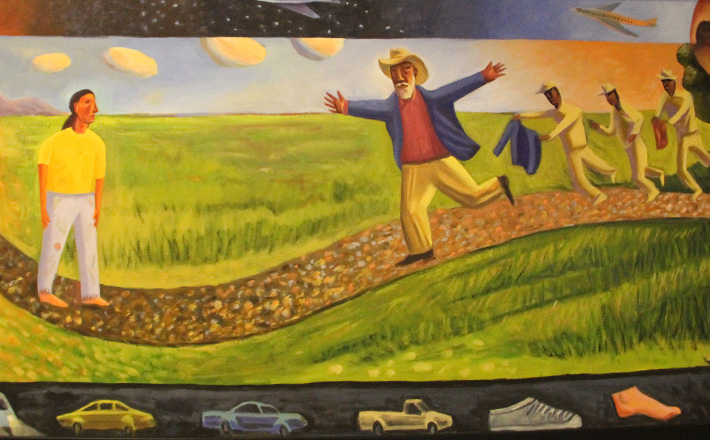Commentary on John 21:1-19
In this third resurrection appearance (verse 14), Jesus comes to the disciples once again, or at least to the seven who are mentioned (verses 1-2).
Peter stays “in character” here as the one who continues to bumble around before realizing what he is actually called to do. His first act in response to two resurrection appearances and the “Johannine Pentecost” (20:22-23) consists of convincing the others to go fishing. His actions follow a typical human pattern–an intense spiritual experience soon fades, and one returns to the same things he or she has always done.
But, Peter’s return to his previous life will be radically transformed. His fishing expedition becomes a new experience of abundance, mirroring Cana’s 120-180 gallons of wine (2:1-11) and the twelve baskets of food left over at the feeding of the 5,000 (6:1-14). The nets that had been empty when used under the disciples’ own power are filled almost to bursting with a word from the risen Christ, who then prepares them a meal (verses. 3-13). This “last breakfast” once again transforms a moment of deprivation and insufficiency into a feast, with unexpected blessing made available for all.
Attention turns to Peter, whose three-fold denial at Jesus’ trial (18:15-18, 25-27) and rapid return to his old occupation are graciously redeemed and redirected in conversation with his Lord (verses 14-19). The terminology of this conversation–with its repeated questions, “Peter, do you love me?” and assertions, “Yes, Lord, you know that I love you”–requires study, starting with the words used for “love.”
It has long been noted–and often noted in misleading ways–that Greek has three words for love (eros, philos, and agapē) where English-speakers must make do with just one.i These three Greek words are often considered to be in something of a ranked order. Eros is placed at the bottom as a self-centered, selfish love that cares little for the well-being of its object. Philos is described as better than eros, but still second-rate, merely consisting of the love between friends, which can be deep, meaningful, and other-directed, but which cannot compare with agapē. Agapē stands in this ordering as the highest form of love, like God’s love for the world (3:16), a pure, selfless love that could only have a divine source.
In this reckoning, one might expect Christ to lead Peter from a lower form of love (eros or philos) to its highest form, agapē; but this is not, in fact, what happens. Jesus’ first two questions use agapē and Peter answers with philos. However, in his third question, Jesus changes the terminology, asking Peter finally, “Peter, do you love me (philos)?” and Peter answers, apparently correctly, “Yes, Lord, you know everything, you know that I love you (philos).” Here and elsewhere in John, the understanding of agapē and philos do not fit the expected scheme. This suggests that the long-standing interpretation is misguided, and it has implications for our own understanding of how God calls us to love.
It is true in John that God’s love or Christ’s love is often expressed as agapē, and numerous times the word carries that highest meaning (3:16; 8:42; 10:17; 11:5; 13:1; etc.). At the same time, agapē and philos can be used synonymously, as in 3:35, where the Father loves the Son (agapē) and in 5:20, where the Father also loves the Son (this time with philos). Further, when describing how judgment takes place–“and this is the judgment, that the light has come into the world and people loved darkness more than the light” (3:19)–the word used for this love of the darkness is agapē. Some people love darkness with an intensity that matches the saints’ love for God.
In addition, at the end of Jesus’ ministry, when John explains why some authorities believed in Jesus but did not confess him publically, it says, “for they loved (agapē) human glory rather than the glory that comes from God” (12:42-43). This agapē is deep and heartfelt. It involves them to the core of their being, and it is entirely misdirected, the “right” love for the wrong things. As the Eagles’ song says, “these things that are pleasing you, hurt you somehow.”ii Just as agapē can be a love that comes from God and leads to life, it can also become desperately distorted, directed toward things that turn us away from God.
When Jesus himself clarifies the highest form of agapē, he does so in terms of philos. Love for friends is no second class love here. “No one has greater love (agapē) than this, to lay down one’s life for one’s friends (philos)” (15:13). In fact, Jesus goes on to define his relationship with his disciples in terms of friendship–“I do not call you servants any longer … but I have called you friends (philos)” (15:15). Jesus calls Peter not just to love but to love others and love them to the end (see 13:1). Peter’s restoration to renewed relationship is also a restoration to a new kind of leadership. Fisherman no longer, he is called to feed Christ’s sheep (verses 15-17) and because of that feeding, eventually to die: “Very truly, I tell you, when you were younger, you used to fasten your own belt and to go wherever you wished. But when you grow old…someone else will fasten a belt around you and take you where you do not wish to go” (21:18). After indicating to Peter “the kind of death by which he would glorify God,” Christ says to him again, “Follow me” (21:19).
This kind of love, whether it is called philos or agapē, involves an inherent expectation of “doing.” Love is as love does. This is love as courage, love as risk, love as not wavering, regardless of what we are called to do. Christ calls Peter and us, as individuals and as communities of faith, to follow him even where we would not otherwise go, even where we might not want to go. The times in which we live are no time for “we have never done it that way before,” no time for returning to what we are used to. These times, more than ever, are times that call for the best love of God, friends, neighbors, and enemies that we can muster. Or, better yet, these times cry out for the love to which God calls us and that God will bring to life within us for the sake of others.
iFor the sake of this discussion, I’m working only with the nouns agapē and philos. I do not use their verbal forms, agapē/agapaō and philos/phileō. For each word, the noun form and the verb form come from the same root word and have the same basic meaning. The point here is the definitions of the words, not the grammar.
iiFrom “Desperado,” by Glenn Frey and Don Henley.


April 18, 2010